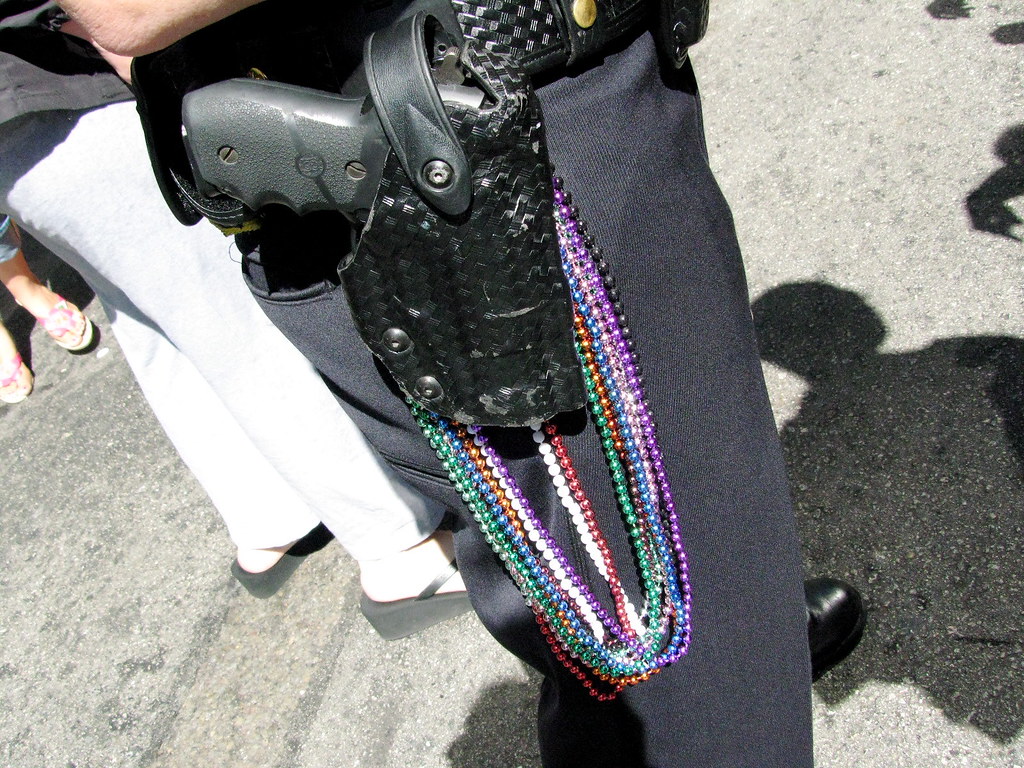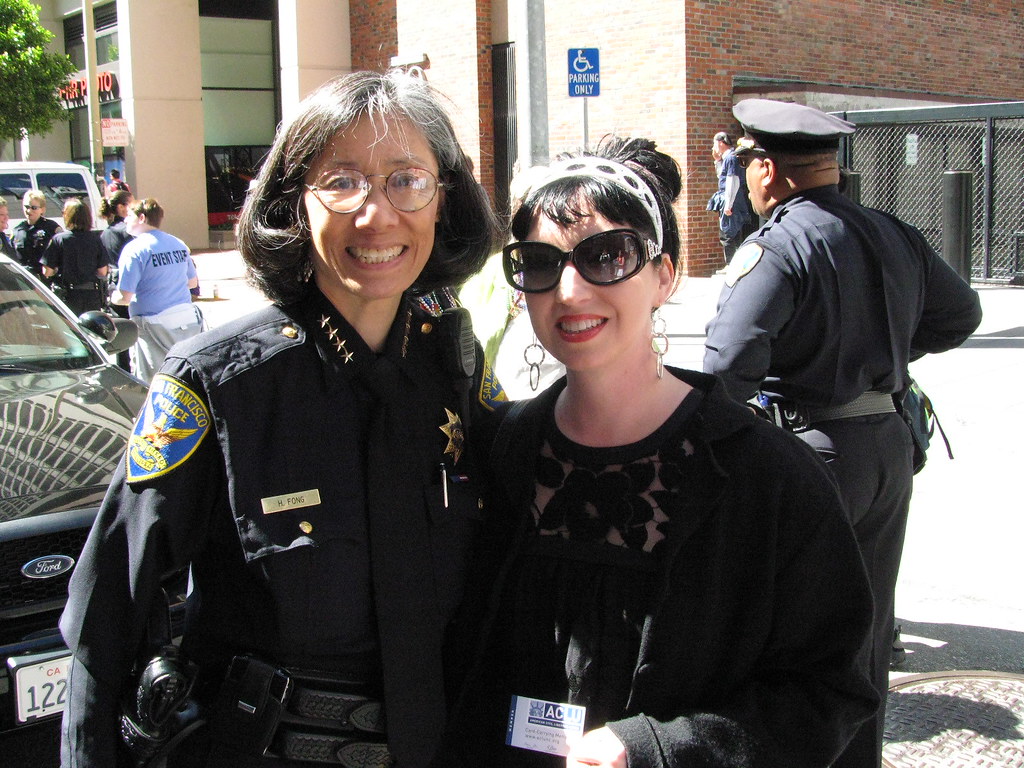
Image: from when I rode with the SFPD contingent in the 2007 Pride Parade.
My dear sweetness Lawgeek sends me this news item on Reuters, about an officer who was fired for running a sex website with his wife when off the clock. A three-judge 9th U.S. Circuit Court of Appeals ruled against the (former) officer’s First Amendment free speech right (and “right to privacy”) focused case — which, of course, directly affects any individual’s sexual privacy online.
The judges ruled that because what the (former) officer did was “vulgar,” “indecent,” “sleazy,” and “disreputable”, he has no right to keep his job as a public servant. The thing is — what the former officer and his wife did was simple, boring amateur porn. I’m surprised anyone even paid for it (I’m sorry). It was just him and her having sex (hello, a man and his wife, in love, etc.), her masturbating, and occasionally her swinging with another woman. They made an amateur paysite — the “offense” here is one couple simply being exhibitionist swingers.
Below is the Reuters piece. After the jump I’ve cut and pasted the opinion of the *one dissenting judge* (from the full opinion on the 9th circuit website, PDF) The dissenting judge (Canby) has a chilling opposition to this. His comments on how this affects the First Amendment, gay rights, adult sexual privacy (and freedom), and even racial relations are worth reading, and bring that whole “chilling effect” home to roost. Reuters:
SAN FRANCISCO (Reuters) – An Arizona police department had the right to fire a police officer who made and sold “vulgar and indecent” sex videos in which he performs with his wife, a U.S. appeals court ruled.
The 9th U.S. Circuit Court of Appeals said on Wednesday that Ronald Dible had engaged in “sleazy activities” and ruled that a lower court had properly dismissed Dible’s claims that the Chandler, Arizona, police department infringed his First Amendment rights to free speech by firing him.
Dible lost his job in 2002 after the Chandler police department learned he was running a sexually explicit Web site featuring him and wife, Megan, which they operated to make money.
“We have not yet abandoned our social codes to the point that a city can be sanctioned for violating a police officer’s First Amendment rights when he causes disrespect of the police department and its members by performing in and purveying pictures of his and his wife’s sexually explicit activities over the Internet,” Judge Ferdinand Fernandez wrote for a three-judge panel.
“Ronald Dible may have the constitutional right to run his sex-oriented business but he has no constitutional right to be a policeman for the city at the same time.
“The law and their own safety demands that they be given a degree of respect, and the sleazy activities of Ronald and Megan Dible could not help but undermine that respect.
“His activities were simply vulgar and indecent.”
Link.
Now hear from the one judge who disagreed (I redacted previous case references for readability — it’s long and only part of his opinion):
* * * * * * *

Image: me holding my ACLU card, with police chief Heather Fong when I rode with the SFPD contingent in the 2007 Pride Parade.
CANBY, Circuit Judge, concurring in the judgment:
With all due respect, I am unable to join the majority opinion because I disagree with its resolution of Dibles First Amendment speech claim. Under the facts of this case and the existing precedent, the police department could not discharge Dible for his website expression without violating the First Amendment.
I have no quarrel with some of the majority’s analysis. I agree that, if Dible’s expressive website activity were properly characterized as employment-related, then his First Amendment claim would fail because his expression, while protected, was not of public concern. The majority opinion correctly reasons that this point is established by City of San Diego v. Roe, 543 U.S. 77, 84 (2004) (per curiam).
Dible’s website activity was not employment-related, however. As the majority opinion points out, Dible was careful not to identify himself or his website with the police department or with police status at all. That fact differentiates his case from Roe. Certainly nothing in the activity Dible portrayed suggested a connection with the police. I am unwilling to conclude, for reasons I will set forth below, that such unrelated expression becomes related to Dible’s employment simply because people who disapprove of his expression find out that he is a policeman and make their disapproval or disdain known to the police department in ways that could affect its work.
(…) Public concern should not be a hurdle depriving employee speech of First Amendment protection when that speech is unrelated to the employment. Now, I recognize that pornography, although apparently popular, is not a very respected subject of First Amendment protection in many quarters. The majority opinion here reflects that distaste, variously characterizing Dible’s expressive activities as “vulgar,” “indecent,” “sleazy,” and “disreputable.” But vigorous enforcement of the free speech guarantee of the First Amendment often requires that we protect speech that many, even a majority, find offensive. See, e.g., Cohen v. California, 403 U.S. 15, 23-25 (1971).
Pornography, and sexual expression in general, is protected by the First Amendment when it does not constitute obscenity (and there is no showing that Dible’s expression meets that extreme standard).
(…) We should accept that fact and accord Dible’s expression the constitutional protection to which it is entitled. The majority opinion here falls short of the First Amendment standard in two major respects.
Because Dible’s expressive activity was not employment-related, the police department must demonstrate that the alleged harm caused by his expression was ” ‘real, not merely conjectural.’ ” United States v. Nat’l Treasury Empl. Union, 513 U.S. 454, 475 (1995) (quoting Turner Broadcasting Sys., Inc. v. FCC, 512 U.S. 622, 664 (1994)).
The evidence of harm in this case is so insubstantial that it can be characterized as “conjectural. ‘ An officer testified that he feared the effect on recruitment of female officers, but no such effect was demonstrated. At least three officers testified that they had been verbally harassed in a manner attributable to the website, but there was no testimony that this seriously interfered with the performance of their duties. In sum, the findings of interference with the mission of the police department are based on the conjecture that Dible’s expressive activities might cause some persons to think less well of the police department and that this disfavor might in some ways lead to disruption of police activities. The evidence simply does not meet the Treasury Employees standard. It does not outweigh Dible’s interest in expression, which is his “interest in engaging in free speech, not the value of the speech itself.” Flanagan, 890
F.2d at 1565.A second flaw in the majority’s analysis is that it enshrines the “heckler’s veto” with respect to all conduct of a public employee, or at least of a police department employee. Nothing that Dible did or said in relation to his website activities in itself caused any disruption to police department functions.
The alleged (and minimal) disruption was caused by other persons’ disapproval of Dible’s activities once it became known that he was an officer of the police department. The rule to be drawn from the majority’s analysis, apparently, is that police officers may be fired for engaging in expressive activities, unrelated to their employment, when numbers of the public disapprove of the expression vigorously and possibly disruptively. That rule empowers the heckler to veto the speech, and is inconsistent with the First Amendment. See Terminiello v. Chicago, 337 U.S. 1, 4-5 (1949). In such a situation, it is the duty of the police department to prevent the disruption by those opposed to the speech, not to suppress or punish the speech. See Cohen, 403 U.S. at 23.
The heckler’s veto applied to sexually expressive activities has disturbing potential for expansive application. A measurable segment of the population, for example, is vigorously antagonistic to homosexual activity and expression; it could easily be encouraged to mobilize were a police officer discovered to have engaged, off duty and unidentified by his activity, in a Gay Pride parade, or expressive cross-dressing, or any number of other expressive activities that might fan the embers of antagonism smoldering in a part of the population.
(…) he has raised a First Amendment defense to his termination because of his website activity. It is equally irrelevant to his First Amendment protection that he sought to make money from his expression, as many speakers or writers do.
(…) It is true that Roe permitted discipline of an officer because of public reaction to his expressive conduct, but that expressive conduct was purposely employment-related. The head of a governmental agency is entitled to control the speech of members of the agency with regard to agency-related matters, unless that speech is a matter of public concern. Pickering, 391 U.S. at 574. But that rule is an exception to the general First Amendment protection of speech.
To apply the same restriction to off-duty expression by a public employee, unrelated to his employment, is to reject the established principle that public employees may not be required to surrender their constitutional right of free speech as a condition of their employment. See, e.g., Keyishian v. Board of Regents, 385 U.S. 589, 605 (1967). Roe did not extend to off-duty conduct unrelated to employment, and accordingly it did not undermine Flanagan and Berger. In my view, the rationale of Flanagan and Berger is not only sound, but constitutionally required. We should apply those principles and hold that Dible’s expressive website conduct was an unconstitutional ground for his discharge.




